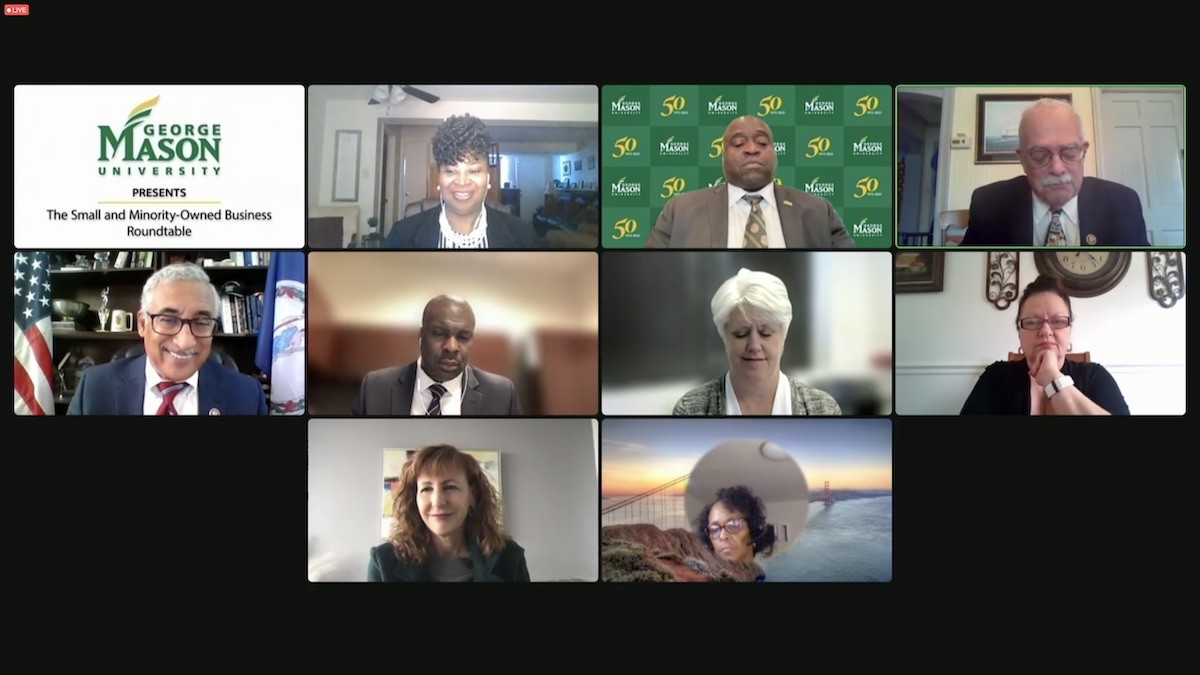
To inform Virginia small business owners about how they can tap into opportunities created by the recently passed Bipartisan Infrastructure Bill, George Mason University on Monday convened a roundtable of legislators, federal and state transportation officials, and representatives of more than 600 small and minority-owned businesses in a free virtual event televised live on GMU-TV.
Maurice A. Henderson II, senior advisor, U.S. Department of Transportation, and Sandra Norman, division administrator for civil rights, Virginia Department of Transportation, joined Virginia congressmen Gerry Connolly and Bobby Scott, Mason President Gregory Washington and others to discuss a bill that Henderson called “a transformative, once-in-a-generation—probably once-in-a-lifetime—investment opportunity.”
Michelle Harris, manager for the Office of Small and Disadvantaged Business Utilization, joined Henderson in representing the the U.S. Department of Transportation at the roundtable.
More formally known as the Infrastructure Investment and Jobs Act, the law is expected to create millions of jobs over the next decade, and fund projects related to roads, bridges, public transportation, broadband access, and other areas.
“We have to have an eye towards recovery that creates new opportunities for those who seek them,” Connolly said. “The opportunities will be immense. Remember, on infrastructure, it is not an expenditure, it is an investment with a return on it. It will be the gift that keeps giving for generations.”
“We know we have to go beyond recovering from COVID-19 if we are going to address the disparities in our economy and keep America competitive in the global market,” Scott said. “And that is what we did by passing this legislation.”
Scott said the best way for businesses to find out about new opportunities is through the Minority Business Development Agency and the U.S. Small Business Administration as well as state programs that serve small businesses.
“We can’t do this by ourselves,” Norman said. “This is a lot of infrastructure dollars coming to Virginia. We have to have partners to make sure that we can deliver the program that the federal government expects us to.”
Mason President Gregory Washington emphasized that Mason is a crucial and willing partner for entrepreneurs around the state. Mason, the largest and most diverse university in the commonwealth, manages the 27 Small Business Development Centers (SBDCs) in Virginia as well as Procurement Technical Assistance Centers (PTACs) and other related small business programs that last year had an estimated $2 billion impact on the state.
Through those programs, Mason supported 10,000 small businesses (more than half led by women or people of color), conducted 27,000 hours of one-on-one counseling and hosted 863 workshops with 18,000 attendees.
In addition, the Mason Virginia Promise, one of President Washington’s signature programs, is a guaranteed pathway to a bachelor’s degree or help starting a business for any Virginian who wants one.
“We want to help entrepreneurs in and around Virginia learn about how they can benefit from the Bipartisan Infrastructure Bill,” Washington said. “This is a big part of our mission at Mason.”
